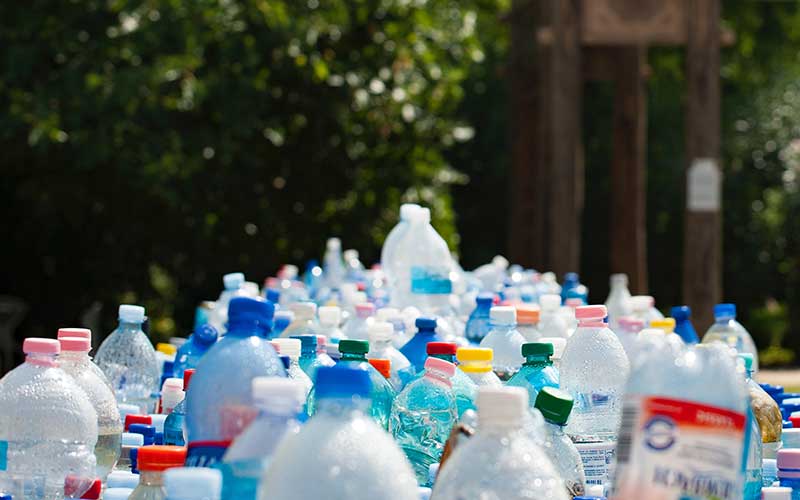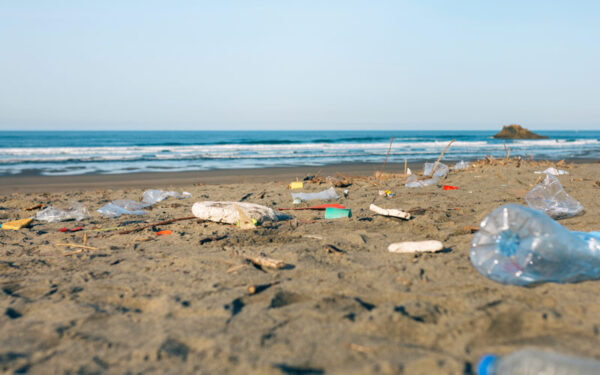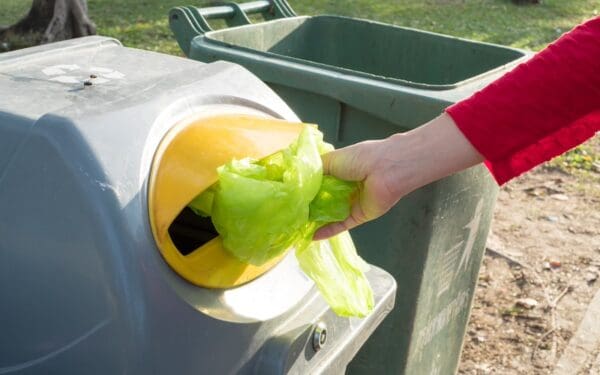
Most of the cheap plastic and paper packaging we throw in our recycling bins is perfect for using once but terrible for recycling. Photo: Mali Maeder via Pexels
Our recycling system is in a crisis. Up until last year, recyclables collected for the U.S. were shipped to China for processing. But then, China stopped accepting our recycling, setting off a chain reaction of problems. In New England and across the country, the cost of recycling for towns and cities is skyrocketing, forcing local governments to shift around their budgets, or worse, consider canceling their programs altogether.
The good news is that the current crisis has exposed fundamental problems with how we recycle – giving us the chance to create a better system. It’s an opportunity to address the bigger issue: the flood of plastic, disposable products barraging our homes and communities constantly – a deluge that we can’t control. Our cities and towns already bear the burden of cleaning up the litter these products create. Now, we’re paying again as recycling costs soar. Meanwhile, the makers of those products profit while taking no responsibility for their polluting products.
As the true cost of our current system is exposed, we must hold paper and plastic producers accountable for the pollution they’re pumping into our communities.
China’s Ban has Exposed our Recycling System as Dysfunctional and Expensive
Most of the cheap plastic and paper packaging we throw in our recycling bins has little or no value compared with new materials. It’s perfect for using once and terrible for recycling.
For the past decade, U.S. recycling companies encouraged cities and towns to adopt recycling systems that mixed paper, plastic, glass, and metal all in one bin. They reasoned this would make it easier for all of us to recycle if we had only the one bin to worry about. Yet, mixing all of these items contaminated the materials, making them more difficult to recycle.
U.S. companies then shipped that mix to China, where underpaid Chinese workers laboriously sorted our waste to Chinese recycling processors benefited, U.S. residents felt environmentally responsible, and producers of packaging kept making money by churning out trash.
What’s more, because China was paying to take all those mixed recyclables, it provided a small revenue stream for U.S. cities and towns – which sufficiently covered the cost of our recycling programs.
By refusing to take any more foreign waste starting in January 2018, China reminded us that we were just exporting a problem, not solving it. Now, residents like you and me are paying the price – literally.
Cities and towns that used to get money back for exporting their recyclables are now paying several times that amount for their recycling programs. This is because our recyclables have nowhere to go. Waste haulers continue to collect and sort our recycling, but they have no way to dispose of that waste. As our recycling continues to pile up, so does the cost of its collection.
In Stanford, Connecticut, the city’s recycling contract skyrocketed from a $95,000 surplus to a cost of $700,000 per year. Residents are having to pick up that enormous difference. Boston’s recycling is expected to increase from $35 to $150 a ton, while Worcester, Massachusetts’s recycling costs are currently $78 a ton – $10 higher than trash disposal.
Essentially, U.S. recycling processors, and the companies making cheap plastic and paper packaging, are placing the cost of managing recycling on cities and towns – in other words, taxpayers like you and me.
These budget changes are becoming the new normal, but they shouldn’t be. The producers of the millions of tons of plastic and paper packaging filling our oceans, landfills, and recycling bins have rigged the system, requiring your tax dollars to pay for their problem.
Producers Must Pay for Recycling, Not You
You shouldn’t bear the burden of paying to dispose of the cheaply produced plastic flooding our communities. That’s why we’re working with local Departments of Public Works and in statehouses across New England to make sure that producers cover the cost instead. Called “Producer Responsibility,” this policy follows the principle of “the polluter pays”– if their product harms the environment, they must bear a share of the cost of that harm.
This isn’t a new idea. Before the plastic age, producers took responsibility for collecting, cleaning, and refilling the containers that held their products. And while cheap, disposable plastic ended the old system, we still have buyback programs today for electronics, paint, batteries, and mattresses.
We can apply the same idea to the packaging stream. In fact, companies like Coca-Cola, Proctor & Gamble, and Unilever are already funding similar programs in Canada, Europe, and Israel.
Producer Responsibility is Good for Your Budget and the Environment
Producer Responsibility requires the manufacturer, producer, importer, or online retailer to pay a fee per ton of packaging material they create. Those fees go to cities and towns to reimburse their recycling costs. The fee links to how recyclable the product is – easily recyclable packaging would cost less, while difficult-to-recycle packaging would require a larger contribution by its producer. Producer Responsibility incorporates environmental costs into a company’s bottom line, making polluting bad for business and saving all of us money on our taxes.
Help Us Fight for a Better Recycling System
We can and must make Producer Responsibility for packaging a reality in New England. The Massachusetts legislature is considering a Producer Responsibility bill this session, while a resolution to develop such a program is under consideration in Maine. Connecticut also considered a Producer Responsibility bill this past session.
You can help. You’re already paying the cost for our broken system. Tell your legislators that you no longer want to subsidize the surge of packaging pollution suffocating our oceans, rivers, highways, and communities. With your help, we can hold producers accountable.
A version of this blog was originally published on April 11, 2019.




